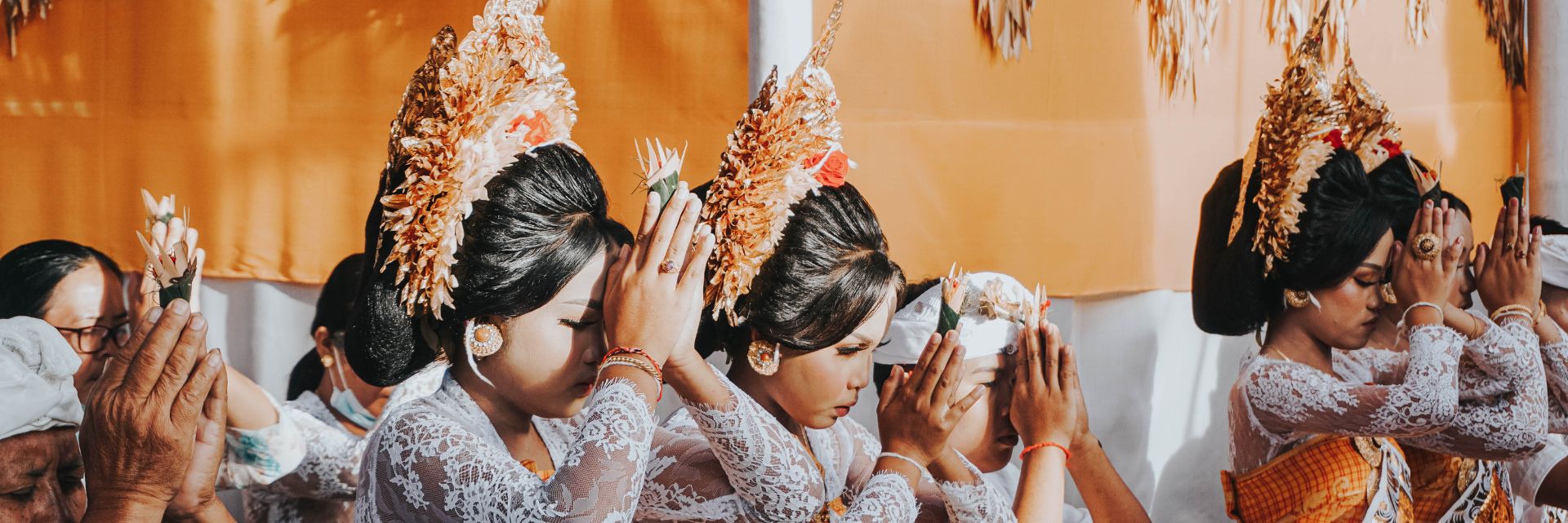
Indonesia has a long and rich history, with evidence of human habitation dating back to around 40,000 years ago. The region was influenced by Indian and Chinese traders, and the Hindu and Buddhist kingdoms of Srivijaya and Majapahit flourished from the 7th to 15th centuries. The arrival of Islam in the 13th century led to the rise of Islamic sultanates, which ruled until Dutch colonization in the 17th century. Indonesia declared independence from the Netherlands in 1945.
Indonesia is located in Southeast Asia and Oceania, consisting of over 17,000 islands, with a total land area of 1.9 million sq km. It lies between the Indian and Pacific Oceans and shares land borders with Papua New Guinea, East Timor, and Malaysia. The country is part of the Pacific Ring of Fire, resulting in many active volcanoes and frequent seismic activity.
Republic of Indonesia
Indonesia has a tropical climate with hot and humid temperatures year-round. It experiences two main seasons: dry season from May to September, and rainy season from October to April. The climate supports lush rainforests and diverse ecosystems across the islands.
Indonesia is the fourth most populous country with over 270 million people. The country is home to more than 300 ethnic groups, with the Javanese being the largest. The population practices diverse religions including Islam, Christianity, Hinduism, and Buddhism.
Indonesia is surrounded by the Indian and Pacific Oceans, and is bordered by several seas including:
Indonesia is one of the world’s megadiverse countries, home to vast tropical rainforests, unique wildlife like the Komodo dragon, orangutans, and numerous endemic species. The country faces environmental challenges such as deforestation, habitat loss, and pollution, but remains a key destination for eco-tourism.
The official language is Bahasa Indonesia. Over 700 local languages and dialects are spoken throughout the archipelago, reflecting Indonesia’s rich cultural diversity.
Indonesia is a vast archipelago that offers a diverse range of experiences, from stunning natural beauty to rich cultural heritage. Here are some of the best places to visit:
Indonesia has many more hidden gems and experiences to offer, whether you're seeking adventure, culture, or relaxation.
Indonesia is a country with a rich cultural heritage, celebrated through a variety of festivals throughout the year:
Each festival offers a fascinating glimpse into Indonesia's diverse cultural fabric and traditions.
✔️ Show respect for local customs and traditions. Indonesians value politeness and courtesy.
✔️ Dress modestly, especially in places of worship. Cover shoulders and knees; remove shoes before entering mosques or temples.
✔️ Use your right hand for eating, shaking hands, and exchanging money; the left hand is considered unclean.
✔️ Bargain at markets and street vendors. Haggling is a common and accepted practice.
✔️ Try local food and beverages; Indonesia offers a rich culinary culture.
✔️ Use common sense and stay safe, especially when traveling alone or at night.
✔️ Be environmentally conscious; avoid littering and damaging natural areas.
✔️ Respect religious and cultural sites; always ask before photographing people.
❌ Don't touch or point with your feet. Feet are considered dirty in Indonesian culture.
❌ Don't consume alcohol in public places, especially in predominantly Muslim areas.
❌ Don't be overly affectionate in public; public displays of affection are uncommon and frowned upon.
❌ Don't litter or damage the environment. Indonesia faces challenges with pollution and deforestation.
❌ Don't criticize or disrespect the government or country. Political dissent is strictly regulated.
❌ Don't ignore traffic rules; roads can be chaotic, so stay alert and careful.
❌ Don't take photographs of military or government buildings without permission.
✔️ Indonesia is the world's largest archipelago, consisting of more than 17,000 islands.
✔️ The country is home to over 300 ethnic groups, each with its own unique culture and traditions.
✔️ Indonesia is the fourth most populous country in the world, with over 270 million people.
✔️ The national language of Indonesia is Indonesian, which is based on the Malay language.
✔️ The island of Java, where the capital city Jakarta is located, is the most populated island in the world.
✔️ Indonesia is home to the world's largest flower, the Rafflesia Arnoldii, which can grow up to 3 feet in diameter.
✔️ The country is home to the world's largest lizard, the Komodo dragon, which can grow up to 10 feet long.
✔️ Indonesia has the world's largest Muslim population, with over 225 million adherents.
✔️ Bali is known as the "Island of the Gods" and is home to many beautiful temples and cultural landmarks.
✔️ Indonesia boasts some of the world's most diverse wildlife, including orangutans, tigers, elephants, and rhinoceroses.
✔️ The country is famous for its beautiful beaches, coral reefs, and marine life, making it a top scuba diving and snorkeling destination.
✔️ Indonesia is the world's largest producer of palm oil, a key ingredient in many household items and foods.
✔️ It also hosts some of the world's largest gold and copper mines.
✔️ Indonesia has over 150 active volcanoes, more than any other country worldwide.
✔️ The traditional martial art Pencak Silat is a national sport and featured in the Southeast Asian Games.
Indonesia offers a wide variety of activities for every kind of traveler. Whether you seek adventure, culture, or relaxation, here are some of the best experiences:
Most visitors to Indonesia require a visa to enter the country. Here’s an overview of the visa process and requirements:
For the latest and most accurate visa information, always check with the Indonesian Immigration Website or your local Indonesian embassy.